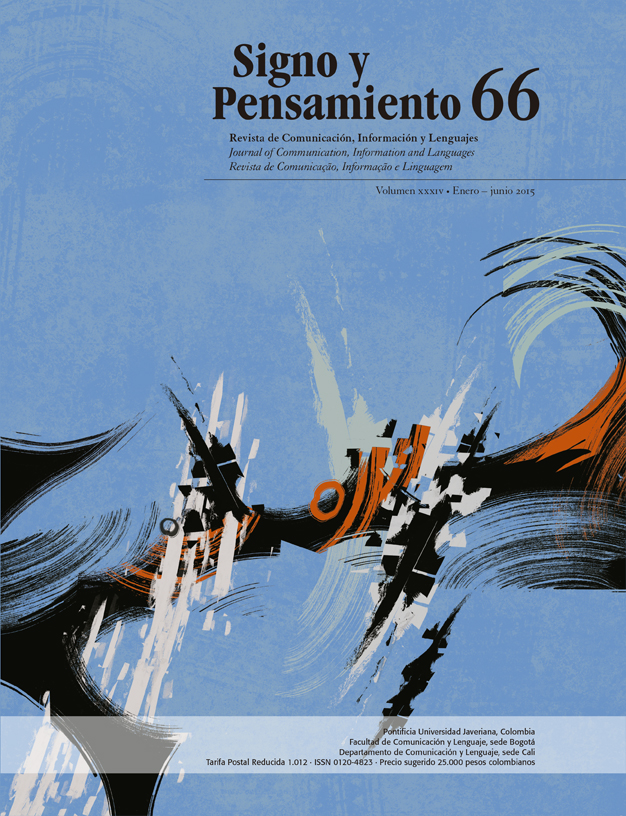Abstract
This article is the result of the metric lexical analysis of Cartagena’s newspaper called Argos Americano (September 1810-March 1812) which shows the various discussions that took place on topics such as nation, government and independence during a turbulent time in which Spain had been invaded by the armies of Napoleon and the King Ferdinand VII was made prisoner, leaving a power vacuum that plunged regions of the American continent in uncertainty to define a government. This work is part of the research project “Cultural History of the Press of the New Granada (1810-1820) sponsored by the Directorate of Research and the School of Communication at the University of La Sabana.
Argos Americano. (11 de marzo de 1811a). Integridad de la monarquía española.
Argos Americano. (11 de marzo de 1811b). Semanario Patriótico.
Argos Americano. (11 de noviembre de 1810). Continúan las reflexiones sobre la federación.
Argos Americano. (14 de enero de 1811). El anciano.
Argos Americano. (18 de marzo de 1811). Contestación.
Argos Americano. (2 de diciembre de 1810). Noticias. Argos Americano. (21 de enero de 1811).
Cortes. Baccala, N., & De la Cruz, M. (2000). La importancia de la estadística textual aplicada al estudio de las teorías implícitas o concepciones de enseñanza. En M. Rajman, & C. Chapellier, Analyse Statistiques des Données Textuelles (pp. 519-526). París: EPL.
Blanco, J. M. (24 de diciembre de 1810). Concluyen las Reflexiones del Español. El Argos Americano.
Chust, M. (1999). Soberanía y Soberanos: Problemas en la Constitución de 1812. Ponencia presentada en el Congreso Internacional. En Los procesos de Independencia en la América Española. Morelia, México, 26 al 30 de julio.
Fernández, M. A., & Fuentes, J. F. (2000). Análisis léxico métrico de El Socialista (1886-1912): un vocabulario de clase. Historia Contemporánea (20), 225-243.
Habermas, J. (1986). Historia y crítica de la opinión pública. La transformación estructural de la vida pública. Barcelona: Gustavo Gili.
Locke, J. (1689). Biblioteca Solot. Ensayo sobre el entendimiento Humano. Recuperado de: http://www.bsolot.info/wp-content/uploads/2011/02/Locke_John-Ensayo_sobre_el_entendimiento_humano.pdf
Múnera, A. (1998). El fracaso de la nación. Bogotá: Banco de la República, El Áncora Editores.
Ortega, F., & Chaparro, A. (2012). Introducción. En F. &. Ortega, Disfraz y pluma de todos. Opinión pública y cultura política, siglos XVIII y XIX (págs. 11-34). Bogotá: Universidad Nacional de Colombia.
Pardo, C. E., Ortiz, J. E., & Cruz, D. (2012). Análisis de datos textuales con DtmVic. XXII Simposio Internacional de Estadística. Bucaramanga, 17 al 21 de julio.
Ramírez, J. G. (2012). Biblioteca Virtual Luis Ángel Arango. El Argos Americano. Papel político, económico y literario de Cartagena de Indias. Recuperado de http://www.banrepcultural.org/blaavirtual/historia/prensacolombiana-del-siglo-xix/el-argos-americano
Restrepo, J. M. (1974). Historia de la revolución de Colombia. Medellín: Bedout. Ripoll, M. T. (2011). El Argos Americano: crónica de una desilusión. En H. Calvo, & A. Meisel, Cartagena de Indias en la Independencia. Cartagena: Banco de la República.
Sourdis, A. (1986). Cartagena de Indias durante la primera república (1810-1815) (Tesis de Grado, Pontifica Universidad Javeriana, Bogotá, Colombia). Valenzuela, E. (9 de junio de 1810). Carta a Don José Fernández Madrid. El Argos Americano.
This journal is registered under a Creative Commons Attribution 4.0 International Public License. Thus, this work may be reproduced, distributed, and publicly shared in digital format, as long as the names of the authors and Pontificia Universidad Javeriana are acknowledged. Others are allowed to quote, adapt, transform, auto-archive, republish, and create based on this material, for any purpose (even commercial ones), provided the authorship is duly acknowledged, a link to the original work is provided, and it is specified if changes have been made. Pontificia Universidad Javeriana does not hold the rights of published works and the authors are solely responsible for the contents of their works; they keep the moral, intellectual, privacy, and publicity rights.
Approving the intervention of the work (review, copy-editing, translation, layout) and the following outreach, are granted through an use license and not through an assignment of rights. This means the journal and Pontificia Universidad Javeriana cannot be held responsible for any ethical malpractice by the authors. As a consequence of the protection granted by the use license, the journal is not required to publish recantations or modify information already published, unless the errata stems from the editorial management process. Publishing contents in this journal does not generate royalties for contributors.


